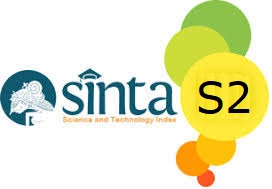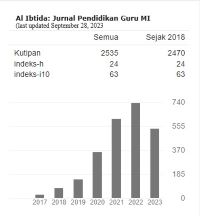Bridging Artificial Intelligence Literacy and Technology Acceptance Among Elementary School Teachers: Evidence from a Structural Equation Model
(1) Universitas Islam Negeri Walisongo Semarang
(2) Universitas Islam Negeri Walisongo Semarang
(3) Universitas Islam Negeri Walisongo Semarang
(4) Universitas Islam Negeri Walisongo Semarang
(*) Corresponding Author
Abstract
Abstract
This study investigates the correlation between artificial intelligence (AI) literacy and acceptance among Indonesian elementary school teachers using a structural equation model. A cross-sectional survey of 409 teachers indicated elevated AI acceptance and literacy levels. AI literacy strongly predicted acceptance and vice versa, suggesting a bidirectional relationship between these two variables. Demographic factors exerted minimal influence, whereas the frequency of AI use showed a moderate correlation between the two constructs. The structural equation model revealed that social influence, facilitating conditions, and the progressive development of AI competencies significantly influenced teachers' behavioral intentions and ethical awareness. These findings underscore the necessity of comprehensive, experiential professional development programs that promote deep, reflective, and ethical engagement with AI technologies. This study advocates for a systemic, culturally responsive approach to AI integration in elementary education, aligning training, infrastructure, collaborative culture, and personalized support to prepare teachers for effective and responsible AI utilization.
Keywords: artificial intelligence, AI literacy, UTAUT, teacher acceptance, elementary education.
Abstrak
Penelitian ini menyelidiki korelasi antara literasi dan penerimaan kecerdasan buatan (artificial intelligence/AI) di kalangan guru sekolah dasar di Indonesia dengan menggunakan model persamaan struktural. Sebuah survei cross-sectional terhadap 409 guru mengindikasikan adanya peningkatan tingkat penerimaan dan literasi AI. Literasi AI secara kuat memprediksi penerimaan dan sebaliknya, menunjukkan adanya hubungan dua arah antara kedua variabel ini. Faktor demografis memberikan pengaruh yang minimal, sedangkan frekuensi penggunaan AI menunjukkan korelasi yang moderat antara kedua variabel tersebut. Model persamaan struktural mengungkapkan bahwa pengaruh sosial, kondisi yang memfasilitasi, dan perkembangan kompetensi AI secara signifikan mempengaruhi niat perilaku dan kesadaran etis guru. Temuan ini menggarisbawahi perlunya program pengembangan profesional yang komprehensif dan berbasis pengalaman yang mendorong keterlibatan yang mendalam, reflektif, dan etis dengan teknologi AI. Studi ini mengadvokasi pendekatan sistemik dan responsif secara budaya terhadap integrasi AI dalam pendidikan dasar, menyelaraskan pelatihan, infrastruktur, budaya kolaboratif, dan dukungan pribadi untuk mempersiapkan guru dalam pemanfaatan AI yang efektif dan bertanggung jawab.
Kata kunci: kecerdasan buatan, literasi AI, UTAUT, penerimaan guru, pendidikan dasar.Full Text:
PDFReferences
Abbitt, J. T. (2021). Gaining insight from survey data: an analysis of the community of inquiry survey using Rasch measurement techniques. Journal of Computing in Higher Education, 33(2), 367–397. https://doi.org/10.1007/s12528-020-09268-6
Acosta-Enriquez, B. G., Ramos Farroñan, E. V., Villena Zapata, L. I., Mogollon Garcia, F. S., Rabanal-León, H. C., Angaspilco, J. E. M., & Bocanegra, J. C. S. (2024). Acceptance of artificial intelligence in university contexts: A conceptual analysis based on UTAUT2 theory. Heliyon, 10(19), e38315. https://doi.org/10.1016/j.heliyon.2024.e38315
Adigwe, I., Mason, J., & Gromik, N. (2024). Investigating the relationship between socio-demographic variables of parents, digital literacy and parental mediation practices in the digital age: Nigeria in focus. E-Learning and Digital Media. https://doi.org/10.1177/20427530241232495
Ahmad, S. F., Alam, M. M., Rahmat, M. K., Mubarik, M. S., & Hyder, S. I. (2022). Academic and Administrative Role of Artificial Intelligence in Education. Sustainability (Switzerland), 14(3). https://doi.org/10.3390/SU14031101
Al-Abdullatif, A. M. (2024). Modeling Teachers' Acceptance of Generative Artificial Intelligence Use in Higher Education: The Role of AI Literacy, Intelligent TPACK, and Perceived Trust. Education Sciences, 14(11). https://doi.org/10.3390/educsci14111209
Ali, I., Warraich, N. F., & Butt, K. (2024). Acceptance and use of artificial intelligence and AI-based applications in education: A meta-analysis and future direction. Information Development. https://doi.org/10.1177/02666669241257206
Alkharusi, H. (2022). A descriptive analysis and interpretation of data from Likert scales in educational and psychological research. Indian Journal of Psychology and Education, 12(2), 13–16. https://squ.elsevierpure.com/en/publications/a-descriptive-analysis-and-interpretation-of-data-from-likert-sca
Allen, L. K., & Kendeou, P. (2024). ED-AI Lit: An Interdisciplinary Framework for AI Literacy in Education. Policy Insights from the Behavioral and Brain Sciences, 11(1), 3–10. https://doi.org/10.1177/23727322231220339
Arnaud, J., São Mamede, H., & Branco, F. (2024). The relationship between digital transformation and digital literacy - an explanatory model: Systematic literature review. F1000Research 2024 13:253, 13, 253. https://doi.org/10.12688/f1000research.146991.1
Ayanwale, M. A., Adelana, O. P., Molefi, R. R., Adeeko, O., & Ishola, A. M. (2024). Examining artificial intelligence literacy among pre-service teachers for future classrooms. Computers and Education Open, 6, 100179. https://doi.org/10.1016/J.CAEO.2024.100179
Bayaga, A. (2024). Leveraging AI-enhanced and emerging technologies for pedagogical innovations in higher education. Education and Information Technologies. https://doi.org/10.1007/S10639-024-13122-Y
Bokolo, A. J. (2023). Examining the Adoption of Sustainable eMobility-Sharing in Smart Communities: Diffusion of Innovation Theory Perspective. Smart Cities, 6(4), 2057–2080. https://doi.org/10.3390/SMARTCITIES6040095
Celik, I. (2023). Exploring the Determinants of Artificial Intelligence (AI) Literacy: Digital Divide, Computational Thinking, Cognitive Absorption. Telematics and Informatics, 83, 102026–102026. https://doi.org/10.1016/J.TELE.2023.102026
Cheah, Y. H., & Kim, J. (2025). STEM teachers' perceptions, familiarity, and support needs for integrating generative artificial intelligence in K-12 education. School Science and Mathematics. https://doi.org/10.1111/SSM.18334
Chen, L., Chen, P., & Lin, Z. (2020). Artificial Intelligence in Education: A Review. IEEE Access, 8, 75264–75278. https://doi.org/10.1109/ACCESS.2020.2988510
Choi, S., Jang, Y., & Kim, H. (2023a). Influence of Pedagogical Beliefs and Perceived Trust on Teachers' Acceptance of Educational Artificial Intelligence Tools. International Journal of Human–Computer Interaction, 39(4), 910–922. https://doi.org/10.1080/10447318.2022.2049145
Choi, S., Jang, Y., & Kim, H. (2023b). Influence of Pedagogical Beliefs and Perceived Trust on Teachers' Acceptance of Educational Artificial Intelligence Tools. International Journal of Human–Computer Interaction, 39(4), 910–922. https://doi.org/10.1080/10447318.2022.2049145
Dearing, J. W., & Cox, J. G. (2018). Diffusion Of Innovations Theory, Principles, And Practice. Health Affairs, 37(2), 183–190. https://doi.org/10.1377/HLTHAFF.2017.1104
Dharmawati, D. M., Busyra, N., & Azhar, E. (2023). Improving Social Science Learning Outcomes of Class V Elementary School Students through the TPACK Approach. Al Ibtida: Jurnal Pendidikan Guru MI, 10(2), 211. https://doi.org/10.24235/al.ibtida.snj.v10i2.12980
Du, H., Sun, Y., Jiang, H., Islam, A. Y. M. A., & Gu, X. (2024). Exploring the effects of AI literacy in teacher learning: an empirical study. Humanities and Social Sciences Communications, 11(1), 559. https://doi.org/10.1057/s41599-024-03101-6
Erol, M., & Erol, A. (2024). Use of Artificial Intelligence (AI) Technologies in Education According to Primary School Teachers: Opportunities and Challenges. Sakarya University Journal of Education, 14(3), 426–446. https://doi.org/10.19126/SUJE.1446227
Farooqi, M. T. K., Amanat, I., & Awan, S. M. (2024). Ethical Considerations and Challenges in the Integration of Artificial Intelligence in Education: A Systematic Review. Journal of Excellence in Management Sciences, 3(4), 35–50. https://doi.org/10.69565/JEMS.V3I4.314
Fathurrachman, S., & Saputri, N. E. (2025). Teacher's Perceptions and Institutional Preparedness For Implementing AI in Learning Assessment at The Elementary School Level. IQRO: Journal of Islamic Education, 8(1), 49–60. https://doi.org/10.24256/IQRO.V8I1.6484
Granström, M., & Oppi, P. (2025). Assessing Teachers' Readiness and Perceived Usefulness of AI in Education: An Estonian Perspective. Frontiers in Education, 10, 1622240. https://doi.org/10.3389/feduc.2025.1622240
Guo, S., Shi, L., & Zhai, X. (2025). Developing and validating an instrument for teachers' acceptance of artificial intelligence in education. Education and Information Technologies 2025, 1–23. https://doi.org/10.1007/S10639-025-13338-6
Hazzan-Bishara, A., Kol, O., & Levy, S. (2025). The factors affecting teachers' adoption of AI technologies: A unified model of external and internal determinants. Education and Information Technologies, 1–27. https://doi.org/10.1007/S10639-025-13393-Z/TABLES/4
Kasneci, E., Sessler, K., Küchemann, S., Bannert, M., Dementieva, D., Fischer, F., Gasser, U., Groh, G., Günnemann, S., Hüllermeier, E., Krusche, S., Kutyniok, G., Michaeli, T., Nerdel, C., Pfeffer, J., Poquet, O., Sailer, M., Schmidt, A., Seidel, T., … Kasneci, G. (2023). ChatGPT for good? On opportunities and challenges of large language models for education. Learning and Individual Differences, 103, 102274. https://doi.org/10.1016/J.LINDIF.2023.102274
Kizilcec, R. F. (2023). To Advance AI Use in Education, Focus on Understanding Educators. International Journal of Artificial Intelligence in Education, 34(1), 1–8. https://doi.org/10.1007/S40593-023-00351-4
Laily, I. F., & Binasdevi, M. (2023). Analysis of the Students' Digital Literacy Skills through Blended Learning at Madrasah Ibtidaiyah in the Post Covid-19 Pandemic. Al Ibtida: Jurnal Pendidikan Guru MI, 10(1), 134. https://doi.org/10.24235/al.ibtida.snj.v10i1.13516
Lavidas, K., Voulgari, I., Papadakis, S., Athanassopoulos, S., Anastasiou, A., Filippidi, A., Komis, V., & Karacapilidis, N. (2024). Determinants of Humanities and Social Sciences Students' Intentions to Use Artificial Intelligence Applications for Academic Purposes. Information 2024, Vol. 15, Page 314, 15(6), 314. https://doi.org/10.3390/INFO15060314
Li, W., Zhang, X., Li, J., Yang, X., Li, D., & Liu, Y. (2024). An explanatory study of factors influencing engagement in AI education at the K-12 Level: an extension of the classic TAM model. Scientific Reports 2024 14:1, 14(1), 1–17. https://doi.org/10.1038/s41598-024-64363-3
Lim, H., & Lee, M. (2023). Development and Validation of the Pre-secondary School Teacher's Artificial Intelligence Literacy Scale. Hagseubja Jungsim Gyogwa Gyoyug Yeon'gu, 23(12), 875–892. https://doi.org/10.22251/JLCCI.2023.23.12.875
Lixia, W., & Lee Jun, C. (2024). TPACK and EdTech Integration in Teaching and Learning Process: A Systematic Literature Review (2014-2024). Communications on Applied Nonlinear Analysis, 31(7s), 487–505. https://doi.org/10.52783/cana.v31.1381
Long, D., & Magerko, B. (2020). What is AI Literacy? Competencies and Design Considerations. Conference on Human Factors in Computing Systems - Proceedings. https://doi.org/10.1145/3313831.3376727
Lu, H., He, L., Yu, H., Pan, T., & Fu, K. (2024). A Study on Teachers' Willingness to Use Generative AI Technology and Its Influencing Factors: Based on an Integrated Model. Sustainability, 16(16), 7216. https://doi.org/10.3390/su16167216
Lucas, M., Zhang, Y., Bem-haja, P., & Vicente, P. N. (2024). The interplay between teachers' trust in artificial intelligence and digital competence. Education and Information Technologies. https://doi.org/10.1007/S10639-024-12772-2
Martínez-Bravo, M. C., Chalezquer, C. S., & Serrano-Puche, J. (2022). Dimensions of Digital Literacy in the 21st Century Competency Frameworks. Sustainability 2022, Vol. 14, Page 1867, 14(3), 1867. https://doi.org/10.3390/SU14031867
Msambwa, M. M., Wen, Z., & Daniel, K. (2025). The Impact of AI on the Personal and Collaborative Learning Environments in Higher Education. European Journal of Education, 60(1). https://doi.org/10.1111/EJED.12909
Ng, D. T. K., Leung, J. K. L., Su, J., Ng, R. C. W., & Chu, S. K. W. (2023). Teachers' AI digital competencies and twenty-first century skills in the post-pandemic world. Educational Technology Research and Development, 71(1), 137–161. https://doi.org/10.1007/S11423-023-10203-6
Nikolic, S., Wentworth, I., Sheridan, L., Moss, S., Duursma, E., Jones, R. A., Ros, M., & Middleton, R. (2024). A systematic literature review of attitudes, intentions and behaviours of teaching academics pertaining to AI and generative AI (GenAI) in higher education: An analysis of GenAI adoption using the UTAUT framework. Australasian Journal of Educational Technology, 40(6), 56–75. https://doi.org/10.14742/AJET.9643
Ning, Y., Zhang, C., Xu, B., Zhou, Y., & Wijaya, T. T. (2024). Teachers' AI-TPACK: Exploring the Relationship between Knowledge Elements. Sustainability, 16(3). https://doi.org/10.3390/SU16030978
Rogers, E. M. (2003). Diffusion of Innovations (Fifth). Free Press.
Rogers, E. M., Singhal, A., & Quinlan, M. M. (2014). Diffusion of innovations. In An integrated approach to communication theory and research (pp. 432–448). Routledge.
Runge, I., Hebibi, F., & Lazarides, R. (2025). Acceptance of Pre-Service Teachers Towards Artificial Intelligence (AI): The Role of AI-Related Teacher Training Courses and AI-TPACK Within the Technology Acceptance Model. Education Sciences 2025, Vol. 15, Page 167, 15(2), 167. https://doi.org/10.3390/EDUCSCI15020167
Schiavo, G., Businaro, S., & Zancanaro, M. (2024). Comprehension, apprehension, and acceptance: Understanding the influence of literacy and anxiety on acceptance of artificial Intelligence. Technology in Society, 77, 102537. https://doi.org/10.1016/J.TECHSOC.2024.102537
Smith, E. E., Kahlke, R., & Judd, T. (2020). Not just digital natives: Integrating technologies in professional education contexts. Australasian Journal of Educational Technology, 36(3), 1–14. https://doi.org/10.14742/AJET.5689
Sperling, K., Stenberg, C.-J., McGrath, C., Åkerfeldt, A., Heintz, F., & Stenliden, L. (2024). In search of artificial intelligence (AI) literacy in Teacher Education: A scoping review. Computers and Education Open, 6, 100169. https://doi.org/10.1016/J.CAEO.2024.100169
Strielkowski, W., Grebennikova, V., Lisovskiy, A., Rakhimova, G., & Vasileva, T. (2024). AI-driven adaptive learning for sustainable educational transformation. Sustainable Development, 33(2), 1921–1947. https://doi.org/10.1002/SD.3221
Susanto, S. (2021). The Integration of Digital Literacy in Learning at Islamic Elementary School to Prevent the Students' Deviant Behavior. Al Ibtida: Jurnal Pendidikan Guru MI, 8(2), 205. https://doi.org/10.24235/al.ibtida.snj.v8i2.9125
Tekin, Ö. G. (2024). Factors Affecting Teachers' Acceptance of Artificial Intelligence Technologies: Analyzing Teacher Perspectives with Structural Equation Modeling. Instructional Technology and Lifelong Learning, 5, 399–420. https://doi.org/10.52911/itall.1532218
Venkatesh, V., Morris, M. G., Davis, G. B., & Davis, F. D. (2003). User acceptance of information technology: Toward a unified view. MIS Quarterly: Management Information Systems, 27(3), 425–478. https://doi.org/10.2307/30036540
Yan, L., Sha, L., Zhao, L., Li, Y., Martinez-Maldonado, R., Chen, G., Li, X., Jin, Y., & Gašević, D. (2024). Practical and ethical challenges of large language models in education: A systematic scoping review. British Journal of Educational Technology, 55(1), 90–112. https://doi.org/10.1111/BJET.13370
Yao, N., & Abd Halim, N. D. (2023). Analyzing Factors Influencing Primary School Teachers' Acceptance Willingness of Artificial Intelligence Technology. ACM International Conference Proceeding Series, 35–41. https://doi.org/10.1145/3637907.3637951
Yusuf, F. A. (2025). Trends, opportunities, and challenges of artificial intelligence in elementary education - A systematic literature review. Journal of Integrated Elementary Education, 5(1), 109–127. https://doi.org/10.21580/JIEED.V5I1.25594
Zhang, W., & Hou, Z. (2024). College Teachers' Behavioral Intention to Adopt Artificial Intelligence Assisted Teaching Systems. IEEE Access, 1–1. https://doi.org/10.1109/ACCESS.2024.3445909
Zhang, X., & Wareewanich, T. (2024). A Study of the Factors Influencing Teachers' Willingness to Use Generative Artificial Intelligence Based on the UTAUT Model. International Journal of Interactive Mobile Technologies, 18(6), 126–142. https://doi.org/10.3991/IJIM.V18I06.47991
Zhao, L., Wu, X., & Luo, H. (2022). Developing AI Literacy for Primary and Middle School Teachers in China: Based on a Structural Equation Modeling Analysis. Sustainability 2022, Vol. 14, Page 14549, 14(21), 14549. https://doi.org/10.3390/SU142114549
DOI: 10.24235/al.ibtida.snj.v12i1.20259
Article Metrics
Abstract view : 37 timesPDF - 8 times
Refbacks
- There are currently no refbacks.
Copyright (c) 2025 Al Ibtida: Jurnal Pendidikan Guru MI

This work is licensed under a Creative Commons Attribution 4.0 International License.
Al Ibtida: Jurnal Pendidikan Guru MI Indexed by:
Editorial Office:
FITK Building, 5th Floor, Department of Madrasah Ibtidaiyah Teacher Education, Faculty of Tarbiyah and Teacher Training, UIN Siber Syekh Nurjati Cirebon. Perjuangan Street of Sunyaragi, Cirebon City, West Java, Indonesia 45132. Phone. 0231-481264, Fax. 0231-489926, Email: alibtida@syekhnurjati.ac.id
Al Ibtida: Jurnal Pendidikan Guru MI is licensed under a Creative Commons Attribution 4.0 International License.



















